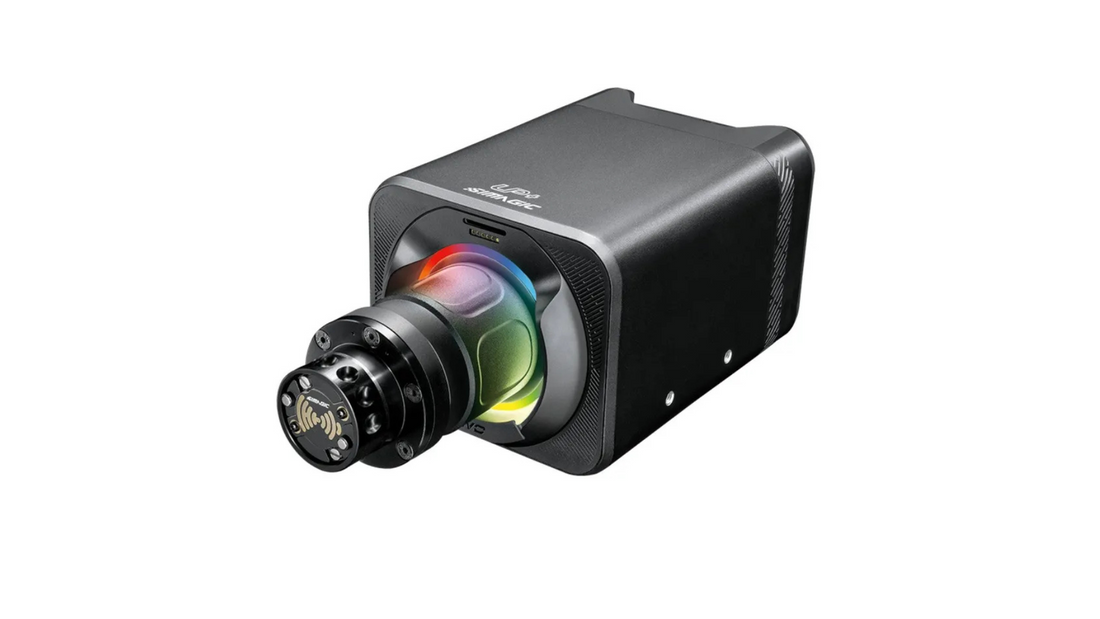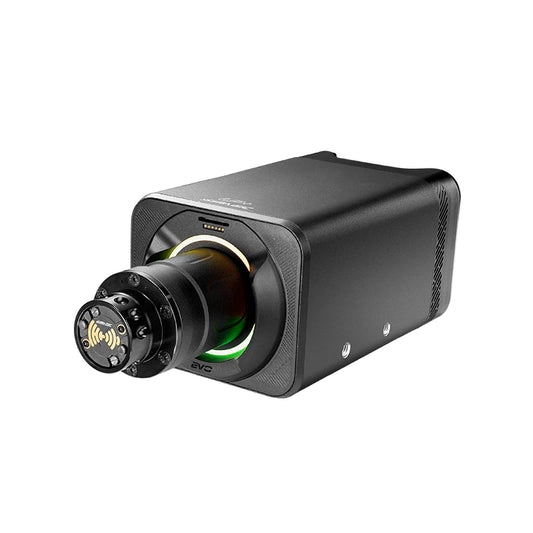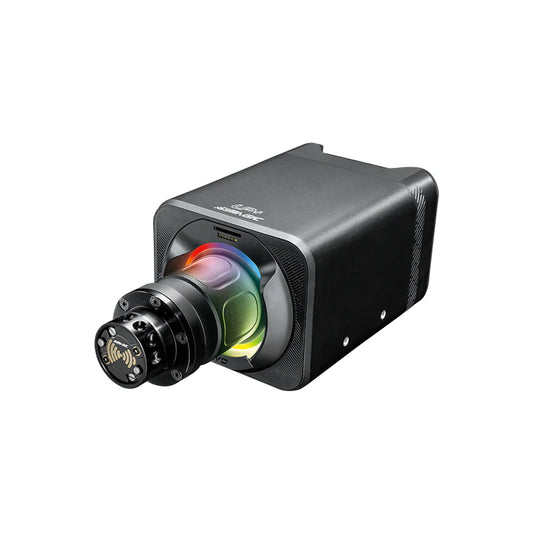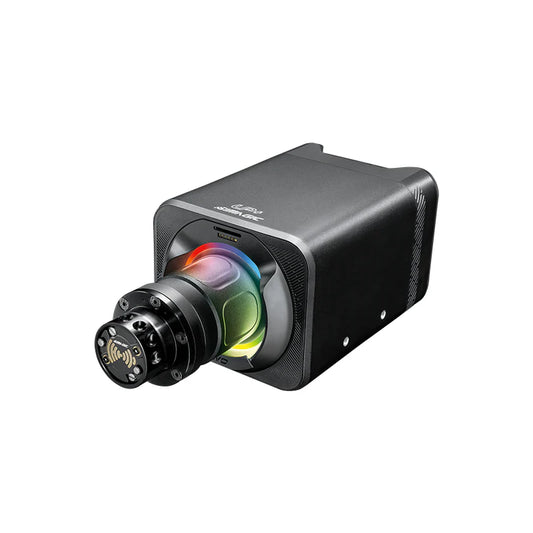
It's That Good - Simagic Alpha Evo Wheelbase Series Review
Share
Yes, this wheelbase is that good.
It's so good that I'm replacing my 23nm Simagic Alpha U with it, and here's why.
The History of Simagic
The Simagic Alpha Evo lineup is the successor to the successful and ground-breaking Simagic Alpha lineup of wheelbases. Everybody knows them: the Alpha Mini (10nm), Alpha (15nm), and the monstrous Alpha U (23nm). And to many reviewers and people (including myself), this was the go-to "bang for buck" wheelbase lineup. But, the Alpha Evo brings a very, very good argument to the table.
Nerding Out About the Alpha Evo
What makes the Alpha Evo so good is Simagic's "zero-cogging" technology. And yes, I, too, thought this was just a marketing scheme—what 99% of sim racing companies seem to be doing: bait-and-switch marketing.
However, Simagic isn't lying; they're telling the truth. The smoothness and precision of these new Alpha Evo bases are levels better than the Alpha Series. Specifically, they are 8x better. Here's why.
The new Alpha Evo series bases have 3 significant improvements: a lighter motor, a 21-bit encoder, and new software.
Lighter Motor
Simagic decided to take a swing at going with a lighter, less powerful motor for all three variants of the Alpha Evo (9nm, 12nm, and 18nm, respectively). This allows the Evo bases to have more detail and precision through the motor. The little bumps and nuances you want in the base for immersion and going faster, the Evo is able to do it. But that's also in part to the next major improvement.
21-Bit Encoder
Compared to the Alpha Series with its 18-bit encoders, the Alpha Evo series has a 21-bit encoder. Now, you're probably thinking "3 bits, that's it? You smell bad." Sorry, it's taken a while to write this. But, let me put this into perspective to you.
In terms of sim racing, each bit measures "points per revolution." That means how many points the encoder will pick up while the steering wheel rotates, aka how much detail you can get out of the base. Those 18-bit encoders translate 262,144 points per revolution, and the 21-bit encoders... 2,097,000 points per revolution. That is 8 times as many points to gather information as the older encoders, which is insane.
Upgraded Software
Of course, better software is the way to truly utilize and extract those points per revolution. With V2 of Sim Pro Manager, you're able to make even more adjustments than before, including slew rate. Whether you're drifting, rally racing, or trying to beat Andrea Kimi Antonelli on iRacing, the upgraded software allows you to get as much data through your hands as possible.
Pricing
So, now that you've been well and truly nerded out with me, let's dive into what most people's constraint is when buying sim racing hardware, which is the pricing.
As you now know, the Alpha Evo Series has three different variants: the Sport (9nm), Evo (12nm), and Pro (18nm). All of them have the same encoders and internals (the Pro has a bigger motor), but they are, of course, bottlenecked/maintained through the software.
And each have a respective pricing (as of 5/1/2025) of $399, $549, and $699. That's $100, $100, and $250 cheaper than the older Alpha variants (the Mini, Alpha, and U).
That's a BIG difference.
But that begs the question, what does that mean for the old Alpha series? Why would Simagic do something like that?
Is the Simagic Lineup Shifting?
Well, if you're competent in marketing and business, you'll understand that this is Simagic's way of phasing out the older Alpha series.
Everything on paper points to the Evo Series as a better base. Unless Simagic upgrades these older bases with 23-bit encoders and bumps the nm by 1-3 per Alpha series base, I don't see why people would go with the older Alpha series over the Evo.
Over the next 2-3 years, the Alpha series will be phased out completely. I can confidently say that the Alpha series will have technical support for the next 6-10 years (as they're built reliably and for longevity, not like an iPhone).
However, it seems that Simagic will invest the majority of its time into the Evo Series and continue to reEVOlutionize that lineup.
Simagic is already planning to create different accessories that solely support the Evo/Up+/Zeus Series.
To conclude, I won't be surprised if Simagic releases bases below the Evo Sport (3-6nm range) and above the Evo Pro (20-40nm range) to cater more to the low-end and high-end markets. Further, I can almost guarantee that this Evo Series will eventually be console compatible.
Should You Get One?
So, now you have all the information, and you're probably wondering if you should get one.
Maybe...
If you have an Alpha, Alpha U, Asetek Forte/Invicta, VRS, Simucube, or essentially any base that's 15+nm with a decent encoder and support, I'd say stick with it. The Evo is great, but it is only nominal compared to these higher-end bases, and most won't feel any difference (or not like the upgrade).
To be clear, these 3 Evo Series bases are AS GOOD as those other bases. For example, the Simagic Alpha Evo Pro has a very similar driving experience to the Simucube 2 Sport, which is an amazing statement for the folks over at Simagic.
But, if you have an Alpha Mini, Thrustmaster T818, Logitech G-Force, or MOZA R9/R12, I'd upgrade to the Pro. For any lower power bases, upgrade to the Evo (if wanted) and belt drive to the Sport (if wanted).
Simagic has revolutionized the introduction of direct drive wheelbases through the Evo Series due to the new technology.
For me, this is replacing my Alpha U, only because I run a sim racing company and can shift through bases. If I didn't run Boundless Racing, I'd likely keep using the Alpha U until support is discontinued. For the average enthusiast though, unless you have a <12nm DD wheelbase or a belt-driven wheelbase, I wouldn't panic for now.
As I said before, I wouldn't upgrade your Alpha series and even these other bases mentioned above until sed wheelbase is no longer supported or breaks.
Check out the rest of the site if you want to read more on the Evo Series, look through any Simagic products, or purchase a Simagic Turnkey Racing Simulator. As always, if you have any questions, send us a message, and we'll help you out!




